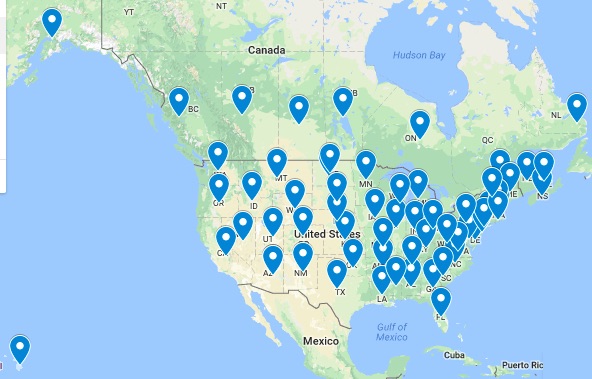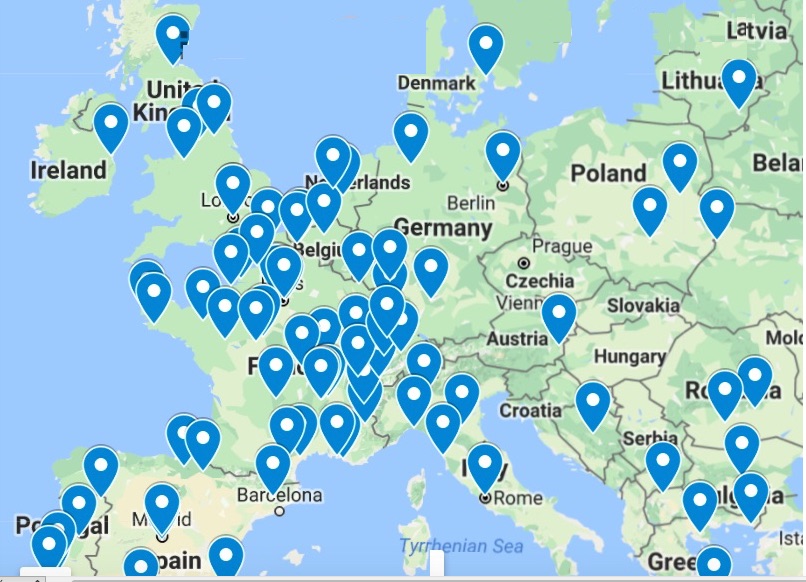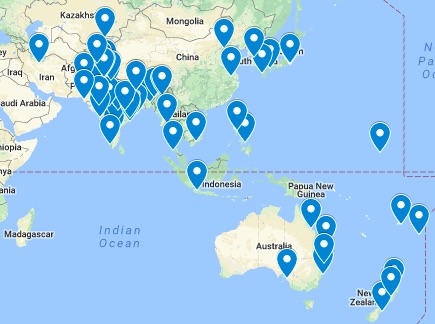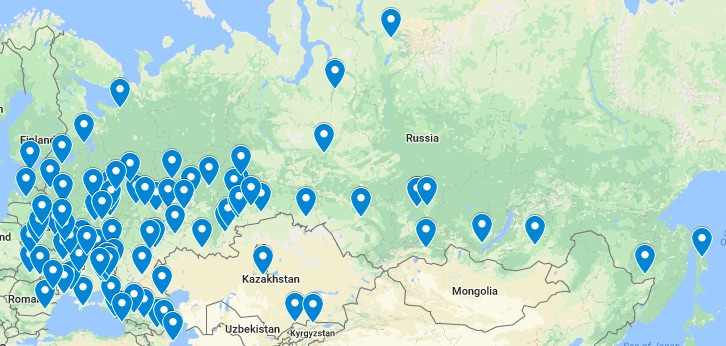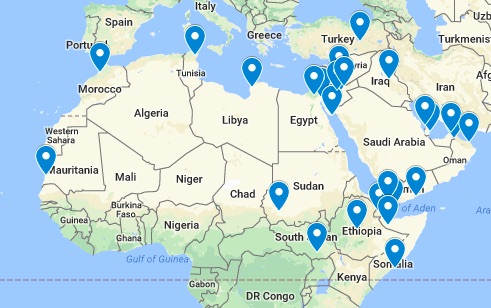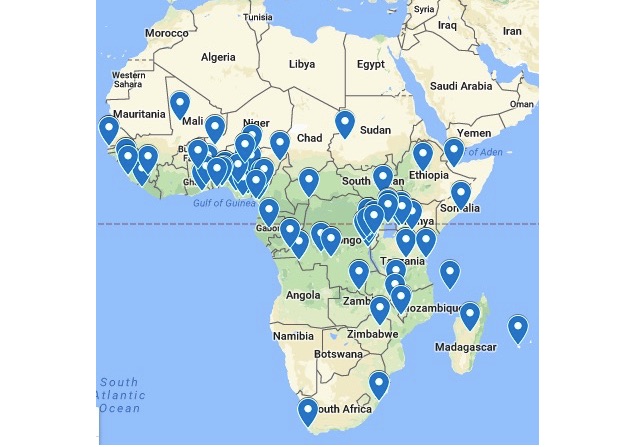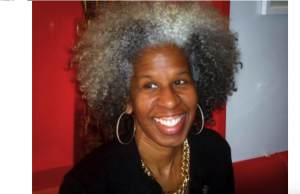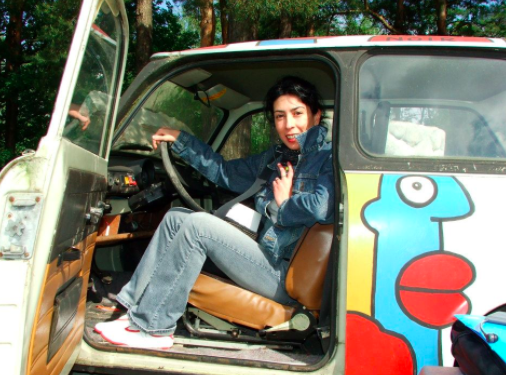A survey by CPNN
We found events in all except one of the states of the United States and all but three Canadian provinces by consulting “Google News” during the week of September 21-28 under the key words “International day of peace”, and “journée internationale de la paix”. In addition, there were many events listed on the following websites, and a few of these events are also listed below in order to cover as many states and provinces as possible.
– Global Feast for Peace,
– UN event map for the International Day of Peace.
– Campaign Nonviolence
To save space, we provide some detail for an event in only one town or city in each state and province, with links to other events in the state concerned.
ALBERTA
Edmonton : Participants will write PEACE with harmless chalk on the sidewalk before their homes, Sept 21.
Edmonton
Calgary
BRITISH COLUMBIA
Surrey : The Global Peace Alliance, Surrey Society (GPA) is pleased to announce its 2017 ‘GIVE PEACE A CHANCE’ (GPAC) SURREY FESTIVAL. This is the second in a series of annual GPAC festivals to commemorate “International Day of Peace” set by the United Nations. We celebrate our cultural mosaic and eliminate cultural misconceptions and intolerance that can lead to conflicts and violence. People come together to enjoy exotic music, songs and dances as well as to look at exhibits of varied cultures around British Columbia, and beyond. Many supporting organizations will be on hand with information and display booths.
Castlegar
Kelowna
Nanaimo
Victoria
MANITOBA
Winnepeg : At Miles Macdonell Collegiate peace day, we have a school wide event where students will be listening to variety of speakers and engaging in hands on workshops that pertain to promoting peace at a local, national and global level.
Winnepeg
NEW BRUNSWICK (nothing found in google)
NEWFOUNDLAND AND LABRADOR (nothing found in google)
NOVA SCOTIA
Halifax : Hosted by the Brahma Kumaris Meditation Centre, Peace Halifax is about rediscovering the magic and practical expression of peace and taking it home with you. Similar events are organized annually in England and the United States. This is the second year for the event in Canada!
ONTARIO
Hamilton : On September 21 throughout the day the University is hosting activities for the campus and general community in support of peace, including a peace walk, peace meditation, and postcards for peace.
Brockville
Kitchener-Waterloo
Toronto
PRINCE EDWARD ISLAND (nothing found in google)
QUEBEC
Montreal : The Mayor of Montreal, Mr. Denis Coderre, accompanied by Mr. Dimitrios (Jim) Beis, responsible for procurement, sports and recreation and communities of diverse origins on the Executive Committee of the City of Montréal and Mr. Brian Bronfman, President of the Brian Bronfman Family Foundation and co-founder of the Peace Donor Network and the Peace Tools Network, hosted representatives of peace organizations at a dinner today the City Hall on the occasion of the International Day of Peace, whose theme this year in Montreal is My Commitment to Peace.
Montreal
Montreal
Québec
Sherbrooke
Victoriaville
SASKATCHEWAN
Regina : To mark the United Nations International Day of Peace, Regina City Hall rose the Peace Flag Thursday morning in front of city hall. The flag will fly until Monday. Also to mark the occasion Mayor Michael Fougere issued a peace proclamation.
ALABAMA
Mobile : Students at Mary B. Austin Elementary will be displaying paper pinwheels in an effort to spread a message of peace to all passers by.
ALASKA
Ketchikan : Ketchikan High School is pleased to announce Kings for Peace, a celebration of International Peace Day on Thursday, September 21, 2017 in the Kayhi Auditorium. At the ceremony, students and community members will join together for the dedication of Kayhi’s peace pole. “May Peace Prevail on Earth” printed on the pole in six languages reflective of Ketchikan’s traditional and contemporary culture will be a visual reminder of the importance of global understanding.
ARIZONA
Peoria : Centennial High School held a special ceremony on Thursday, Sept. 21, at the Peace Pole, located outside of the school gym, to commemorate the International Day of Peace. The Peace Pole was donated by the Peoria Rotary Club in 2016 and offers a place of solace where students and staff can go to reflect and relax.
ARKANSAS
Hot Springs : 8th Annual Seeds of Peace, Hot Springs Creek Greenway Trail. Welcome aboard the starship of peace! It’s time to celebrate our 8th Annual Seeds of Peace a community festival commemorating the International Day of Peace. Sponsored by REGARD- Recognizing Everyone’s Gifts & Rting area on campus.
CALIFORNIA
San Diego : International Day of Peace in La Mesa. Festivities include music, activities, interaction, discussions, and outreach opportunities. Over twenty peace promoting groups will be presented. Representatives of various faith traditions will give testimony to a commitment to promote peace, support diversity, non-discrimination, and the acceptance of people of all faiths and cultures. Sponsored by The Interfaith Council of La Mesa.
Fremont
Los Angeles
Los Angeles
Manila
Manteca
Ojai
Sacramento
Sacramento
Tracy
COLORADO
Pueblo : International day of peace flotilla The 23 annual Peace Flotilla is scheduled from 5:30 to 7:30 p.m. Oct. 8 at the Nature and Raptor Center of Pueblo. . . .The flotilla is open to students, who may bring 6 foot by 6 foot floats designed with messages of peace for launching in the Arkansas River.
Steamboat Springs
Windsor
CONNECTICUT
Guilford : The Guilford First Congregational Church sponsored the United Nations International Day of Peace Observance on Sept. 21, which took place on the Guilford Green. Dozens turned out for a short march followed by speakers and song.
Wilton
DELAWARE
Wilmington : 4th Annual March for a Culture of Peace . Let’s bring everyone together—city and suburban; black, brown and white; Anglo, African, and Hispanic; native-born and immigrant, advantaged and disadvantaged; Christian, Muslim and Jew; young and old; people of all political views—to show that we are one community opposed to violence, murder, poverty, racism, and exclusion. This is our fourth annual March for a Culture of Peace.
Where: March begins and ends in Wilmington’s Rodney Square, 10th & Market, Wilmington, DE, 19801,followed by A Day of Peace (event described below)
What: A peace march through Wilmington’s West side/Hilltop neighborhood, ending in a rally.
When: 11:30 am to 12:30 pm, followed by Day of Peace (below)
FLORIDA
Cape Coral – Organizers are proud to present the 10th annual Peace Day in the Park in beautiful Alliance for the Arts Center. This grassroots community event has grown stronger and more vibrant every year with featured musicians, artists, performance groups and vendors all sharing with you their personal vision and expression of peace. In honor of the International Day of Peace and in collaboration with the organization Peace One Day, the intent is to think peace, cultivate peace and help it grow.
Gainesville
–
GEORGIA
Atlanta : Sunday, Sept 17th the UUCA’s youth is hosting a Posts for Peace: International Day of Peace event with music, readings, and performances. We’ll have a table for folks to create peace flags, which will be displayed in the classrooms. The youth will organize a donation table to collect funds for hurricane Relief (Harvey & Irma).
HAWAII
Honokaa : Honokaa’s 11th Annual Peace Day Parade featured hula halau, the Honokaa High School marching band, magic, Taiko drumming, the jazz band, bon dancers, belly dancers, circus performers and thousands of origami cranes collected for Peace Memorials in Hiroshima and Nagasaki. The free, family friendly event is a tradition in the former sugarcane plantation town, and lets people of all ages give peace a chance. . . . Hawaii is still the only state with a permanent Peace Day that coincides with the United Nations International Day of Peace.
Kauai
Honolulu
IDAHO
Boise : At JUMP. Celebrate what’s right with the world at this free community event! A group mediation will be guided by Ashalome Lynne in our outdoor Celebration Circle along 9th St. Let’s gather, unite and cultivate, acceptance and community through meditation and togetherness. All ages with parent.
ILLINOIS
Macomb : An International Day of Peace Celebration will be held at Western Illinois University at 7 p.m. Thursday, Sept. 28, in the University Union Lamoine Room. This year’s University theme is “Cultivating Peace at Home and Abroad: Our Social Responsibility,” which poses the proposition that together, we as people can take on big and meaningful projects that allow us to live more peacefully. Riad Ismat, an award-winning playwright, director and author from Syria, who has taught at Northwestern University, will join the conversation, as well as share some of his writing from his own experiences living in a war-torn country, as described in his lecture “Living Dangerously.”
Chicago
Chicago
INDIANA
Elkhardt : Hundreds of local students took a page from the 1960’s and dressed up like hippies. It was part of International Day of Peace– which included efforts to deal with bullying. More than 700 students from Pinewood Elementary took to the streets Monday. Many dressed in colorful tie-dye shirts, carrying signs, and chanting. But it was all part of celebrating the International Day of Peace. A day when staff talked with students about why bullying is wrong and friendship is important. The school dubbed the day Hippie Peace Day.
Indianapolis
IOWA
Grinnell : International Day of Peace on the Grinnell Campus. The Peace and Conflict Studies (PACS) Committee marked the International Day of Peace yesterday with a screening of “Nilob’s Story, a film by Grinnell students Misha Gelnarova and Matt McCarthy. “We thought this was pretty relevant, especially with the recent travel ban,” said Ala Akkad ’19, a member of the PACS committee who helped organize the event. “I think it’s something that will interest more Grinnell students because it’s something that’s more real when you think about the context of a student who’s gone through it.” . . . .Gelnarova, who is from the Czech Republic, was inspired to document a story of the refugee crisis in Eastern Europe as a response to increasingly violent anti-refugee rhetoric on the Czech public and political stage.
Panora
KANSAS
Topeka : At the Lawrence Arts Center Thursday evening, guests will come together to recognize an international day of peace. And cellos. Without the background behind it, this pairing may seem unrelated, but there is a distinct connection. Fifty-four years ago, Spanish cellist Pablo Casals, was awarded the U.N. Peace Medal by president John F. Kennedy. So on Sept. 21, the international day of peace, the LAC will commemorate Casals and his commitment to peace, justice and freedom.
KENTUCKY
Louisville : International Day of Peace at the University of Louisville;
1) Creating a Peace Pole: “What Does Peace Mean to Me?” at bottom of SAC ramp, all day;
2) Peace and Ethnic Relations Psychology: Students studying this highly pertinent topic are creating art and showing unity. Aid them in creating art through short activities;
3) Peace Expressions: an inclusive and diverse selections of Registered Student Organizations, individual students, faculty and staff present “What Peace Means to Me.” Red Barn, 6 pm-8pm
LOUISIANA
Roseland : On Sept. 21, Roseland Montessori celebrated International Day of Peace. Maria Montessori believed peace education was key to a peaceful world and that it begins with the child. The school was asked to participate in a sing peace around the world international event. More information and to see the school feature can be found at singpeacearoundtheworld.com/. [Editor’s note: the world map for this is as densely populated as the map for all celebrations of peace day !! ]
Lafayette
Ruston
MAINE
Belfast : Students and staff at Cornerspring Montessori School celebrated the International Day of Peace Sept. 21 at their new school on Congress Street. . . . This year’s event featured singing, wishes for world peace and a parade.
MARYLAND
Frostburg : For the International Day of Peace, Frostburg State University and Allegany College of Maryland will highlight the importance of peace globally, in our communities and within ourselves through the following series of events, all of which are free and open to the public. At 2 p.m. on Friday, Sept. 22, following the tree dedication at FSU, students from FSU and ACM will participate in “Planting Seeds of Peace,” an interactive public presentation by Srimati Karuna, director of the Mahatma Gandhi Memorial Center in Washington, D.C. “Planting Seeds of Peace” will explore Gandhi’s enduring message of peace, his philosophies and his life’s work, as well as ways people can practice the concept of peace in their lives.
Frederick
(Survey continued in right column)
What has happened this year (2017) for the International Day of Peace?
(Survey continued from left column)
MASSACHUSETTS
Beverly Farms : The Glen Urquhart School celebrated both the International Day of Peace and the beginning of Rosh Hashanah. Head of School David Liebmann led our community of students and teachers in embracing peace within oneself by sharing a moment of mindful silence. We followed this reflective moment by singing and signing John Lennon’s iconic peace anthem “Imagine.” Throughout this past week, students created pinwheels for peace. Led by upper school teacher Christine Draper, GUS students decorated and assembled the pinwheels and wrote their thoughts about war and peace, tolerance, and living in harmony with others. Yesterday, the students “planted” these expressions of hope in the lower school courtyard as they gathered for the celebration.
Boston
Boston
Boston
MICHIGAN
Troy : The Know Your Neighbor Initiative invites the community to attend the International Day of Peace observance at the Troy Public Library’s Peace Garden, 510 W. Big Beaver Road, at 7 p.m. Thursday, Sept. 21. The KYN Initiative is a joint effort of many civic, government and school representatives. The program will feature community leaders’ reflections on peace, several musical selections from the Troy High School Orchestra and a dedication of hand-crafted shawls and coloring pages of peaceful images that will be shared at local women’s shelters and veterans’ facilities.
MINNESOTA
Northfield : Community members of all ages rallied together Thursday evening Bridge Square to celebrate International Day of Peace and to show their support for a peaceful future across the globe. Students led the rally as speakers and performers, communicating the significance of the international holiday and why the next generation needs to step up to shape their future, Sunny Leonard, sixth-grader and rally organizer, made the closing speech before the march to Carleton College’s Weitz Center of Creativity. She said youth are the future and it’s they who needs to decide how that future will look.
Moorhead
St Paul
MISSISSIPPI
Jackson : Judah Christian Fellowship: Two events planned: 1. Peace Activity in Head Start classroom, 2. Prayers for Peace on International Day of Peace
MISSOURI
Timberland : Members of the Timberland High School Art Club planted over 1,200 pinwheels around the exterior of their school on September 21st in recognition of International Day of Peace. The pinwheels were created by Timberland students, staff and families in conjunction with “Pinwheels for Peace,” a project that was initiated in 2005 by two art teachers in Florida as a way for students to express how they felt about what was going on in the world around them. Last year, Pinwheels for Peace organizers estimate over 4.5 million pinwheels were displayed world-wide on the same day in multiple countries. “In today’s world, peace needs to be more than just a word,” is the motto shared on the project webpage, www.pinwheelsforpeace.com.
MONTANA
Poison: Meditations for peace
NEBRASKA
Omaha :
Celebration of the diversity here in Omaha and the richness added to our community by people from other countries and cultures.
Listen to peoples stories as refugees.
Interfaith Prayers for Peace
Food and fellowship
NEVADA
Las Vegas International Peace Days celebrated September 21-24.
September 21: Global Peace Meditation and Candle Light Peace Walk
September 22: Breath of Joy, Breath of Peace
September 23: Play for Peace • Compassion Games
September. 24 : Meditation and Peace Labyrinth Walk & Talk
NEW HAMPSHIRE
Middletown : Thirty Mater Dei Prep students were honored to attend and present their Educational Tool Kit Project to the United Nations at the International Day of Peace Conference last Friday, Sept. 15. present the Emerging Global Leaders service project to the United Nations General Assembly. It was one of ten projects selected worldwide to present to the United Nations. The “Education Tool Kit” will primarily benefit refugees forced into migration around the world.
NEW JERSEY
Brookdale : Brookdale Community College. Members of the Brookdale Educational Opportunity Fund’s (EOF) Rising Leaders Academy joined with representatives from the Asia Society and Gateway to Japan on Sept. 21 to hold a college-wide rally for peace in the Student Life Center. The event, held on this year’s International Day of Peace, featured a wide range of activities, information booths and prize raffles designed to educate community members about ongoing global peace initiatives and enlist them in a world-wide effort to enact social change.
NEW MEXICO
Albuquerque : You and your family are invited to celebrate the UN International Day of Peace and Campaign Nonviolence Week of Direct Actions at the Peace Day Block Party, Saturday, Sept. 23 from 3-7pm at the Albuquerque Center for Peace & Justice, . . . There will be music, poetry,dances, food trucks, social justice tables and more.
NEW YORK
New York : On Thursday, September 21st from 11am to 12:30pm a Peace Day Party will happened in Times Square’s Duffy Park right in front of TKTS Bleachers. Paul Sladkis and the Good News Corporation will create the largest Human Peace sign. Participants can sing, dance, Hugg-A-Planets and more. At 12 noon a moment of silence will be held. On the Clear Channel billboard at 1567 Broadway, right off 47th street Ringo Starr, Paul McCartney, Michael Douglas, Dr Jane Goodall, Dr. Mahmet Oz, Ed Asner, Dr. Deepak Chopra, Leonardo DiCaprio, Stevie Wonder, Shikira singing Imagine, and more will appear. If you can not make the event you can watch on www.PeaceChannel.TV ,www.goodnewsplanet.TV www.goodnewsbroadcast.com , www.peacedayparty.org, Bonbon Live Facebook, www.nyclivemedia.com/live, 3D Broadcast & 1,000’s of channels.
Geneseo
Herkimer
Hamburg
New York
New York
NORTH CAROLINA
Asheville : Join PEACE DAY ASHEVILLE in celebrating the
International Day of Peace with a DOUBLE BLAST OF PEACE. We will have 2 screenings as part of the event starting at 6:30PM. INSIDE PEACE and TOGETHER FOR PEACE
INSIDE PEACE – Four years in the making, Inside Peace is a feature documentary that focuses on four men incarcerated at the Dominguez State Jail in San Antonio, Texas, who embark on a journey of self-discovery. With lives marked by generations of violence, addiction, and poor social conditions, they attend a Peace Class and begin the struggle to discover their humanity and rebuild their lives from the inside out. TOGETHER FOR PEACE: The 2017 Peace Day Global Broadcast combines music from the planet’s leading artists, messages from peace leaders and inspired individuals, and news about communities finding ways to solve humanity’s greatest challenges. More than a broadcast, it’s a journey – an experience of what its like to live in a world of peace and positive action.
NORTH DAKOTA
Bakken : The Williston Herald stopped by for International Day of Peace at Bakken as well! We’re proud to be the only people in the state of North Dakota registered and celebrating International Day of Peace.
OHIO
Urbana : Urbana University a branch campus of Franklin University, the City of Urbana and Champaign County community members will gather in their homes, parks, churches, community centers, offices and schools for a “Feast for Peace.” Community members will share a meal and join in conversations about “peace” and what it means to live a life of peace in the midst of challenging and tumultuous times. This event will begin at 6 a.m. and continue until 10 p.m
Canfield
Dayton
Kent
Worthington
Zanesville
OKLAHOMA
Oklahoma City : The United Nations Association of Oklahoma City (UNAOKC) hosted a rally at the Oklahoma State Capitol building on Thursday in honor of U.N. International Peace Day.An estimated crowd of 40 gathered at the at the steps of the Capitol at 6 pm for a casual rally before the special session began Monday.
OREGON
Ashland : Ashland Culture of Peace Commission is hosting various concerts, labyrinths, vigils, talking circles for the 11 Days for Peace. 9/11 is the beginning of 11 Days for Peace culminating on 9/21 the International Day of Peace. . . . .A vigil will be held each day on the Ashland Plaza throughout the 11 Days for Peace where challenges to peace are explored. . . ..A talking circle will be held daily from 11 am to noon at the Ashland Culture of Peace Commission office, 33 First St. Suite 1, Ashland, to explore qualities that help create peace solutions. Our daily focus includes: Forgiveness, Inclusivity, Accountability, Compassion, Respect, Gratitude, Embracing Change, Love, Empathy, and Peace. We invite you to explore,experience, share and participate in creating a Culture of Peace within – and in our beloved city.
PENNSYLVANIA
West Chester The Chester County Peace Movement’s commemoration in West Chester focused on “hate has no home here” with guest speakers and musical performances. We came together to celebrate our common humanity! – Chris Barr, CCPM President, gave the introduction and presented the speakers: Dan Schatz Musician and Speaker; Akbar Hossain Speaker; State Senator Andy Dinniman, 19th District; Dolly Wideman-Scott from the Domestic Violence Center of Chester County. Music was provided by Concordia Choral Arts. State Representative Carolyn Comitta, 156th Districread a proclamation from the State Legislature. Jordan Norley, West Chester Mayor, presented a proclamation from the Borough. We finished with lighting of the Candles in Remembrance and Singing of “Let there be Peace on Earth”
Allentown
Bethlehem
Kutztown
Pittsburgh
Scranton
South Lebanon
University Park
RHODE ISLAND
Kingston : The University of Rhode Island celebrated its 9th Peace Day on the Quad on September 21, 2017, on International Day of Peace. . .. The Center for Nonviolence & Peace Studies was joined in sponsorship this year by Violence Prevention & Advocacy Services, the Women’s Center, and Public Safety Department.Thousands of students dropped by to create and hang a peace flag, get a “Hug for Peace,” and to form the Human Peace Sign.
SOUTH CAROLINA
Columbia : Brockman Elementary School had their 16th Annual International Day of Peace celebration Thursday. The school partakes in this celebration because the founder of the school believed that promoting peace throughout the world starts with the children. During the celebration there are several different musical performances, speeches, and the Dove Peace Award is given to a member of the community that best reflects what it is like to be a peacemaker. This year’s recipient is Kassy Alia . . .. who lost her husband, Greg [a policeman], in the line of duty in 2015. Since then she has turned tragedy into positivity and peace. She has started many community organizations dedicated to building better relationships between law enforcement and the communities they serve.
Laurens
SOUTH DAKOTA
Sioux Falls : Gather for Peace in our World! Help celebrate the United Nations International Day of Peace.
TENNESSEE
Memphis : Whitehaven youth came together Thursday to hold an anti-violence walk in honor of International Day of Peace.
The goal of the walk is to equip teens to fight not only violence, but bullying and other issues without using guns or fists. The Hooks Job Corps Center held the “Youth 2 Youth” walk, which went from the center on McAlister Drive to Shelby Drive and back to the center. Enita Jacobs-Simmons, the national director of more than 130 Job Corps Centers around the nation, also led a peace walk in Washington, D.C. with one representative from each center.
Chattanooga
Knoxville
TEXAS
Laredo, : Texas A&M International University held its International Day of Peace celebration, hosted as a joint effort between the Officer of International Engagement and the Rotary of Laredo. The campus installed a “Peace Pole” along with “Peace Rocks” which are meant to be symbols of unity, humanity and a common wish for world peace. The United Nations International Day of Peace is observed around the world each year on September 21st. Peace Day Provides a globally shared date for all humanity to commit to peace above all differences.
Austin
Houston
Tyler
UTAH
Orem : Utah valley University Interreligious Engagement Initiative celebrates the U.N. International Day of Peace with an open house celebration in the Reflection Center!
VERMONT
Newbury : Students and staff from Newbury Elementary School walk on a trail to the top of Tucker Mountain on Thursday, Sept. 21, 2017, in Newbury, Vt. Newbury and Bradford Elementary Schools met at the top of the mountain to celebrate World Peace Day.
Winooski
VIRGINIA
Lexington : Today is the United Nation’s International Day of Peace. And in Lexington, they’ve been marking it with prayer services, yoga, and other gatherings around the town with “Rockbridge Together for Peace.” “I’ve known about it for several years. I’ve always wanted to do something because there are lots of places around the globe that are connecting to each other with the international day of peace,” says Karen Stanley, an organizer of the events. “So it was exciting just to add our little town into that mix and do something for peace.”
Charlottesville
WASHINGTON
Spokane, Bellingham, Seattle and Vancouver : Today, cities across Washington state are celebrating the International Day of Peace. In Spokane, people are gathering at Gonzaga University to celebrate with the World Peace Flag Ceremony, where each of the world’s 194 national flags are presented and blessed. . . .Cities across the Evergreen State have been celebrating Campaign Nonviolence Week, which ends Sunday, September 24. The campaign, which is sponsoring the flag ceremony, is a grassroots movement where people gather at marches, rallies and vigils to celebrate peace, justice and sustainability. Events are planned in Bellingham, Seattle and Vancouver. This Peace Day comes at a time of increased hostility toward refugee and immigrant communities across the country. Joan’s husband Hank Broeckling, also co-director of One Peace Many Paths, said the point of the flag ceremony is to soothe the current political climate and celebrate humanity’s oneness.
Seattle
WEST VIRGINIA (nothing for International Day of Peace found on google)
WISCONSIN
Manitowoc : Manitowoc Lincoln High School International Baccalaureate (IB) students hosted other Wisconsin IB schools for an International Day of Peace planning workshop. Students brainstormed ways they could work together to make their communities better.
La Crosse
WYOMING
Casper : The theme for 2017 is “Together for Peace: Respect, Safety and Dignity for All.” Help build a culture of peace in Casper with Campaign Nonviolence of Wyoming. Come celebrate and support you and your neighbors working together to create a safe and respectful community for all.
In addition to the events notes above, the Campaign Nonviolence mobilized an enormous number of events, as they say, “During this year’s Campaign Nonviolence Week, September 16-24, 2017 our goal was 1000+ marches, vigils, rallies and more for a culture of peace and nonviolence in cities and towns in all 50 states and in nations around the world. We reached over 1600 in 2017, thank you! Together we marched against violence and for a world of peace, justice and sustainability. We connected the dots between war, poverty, racism, climate change, and the epidemic of violence — and joined forces for a culture of peace.” Click here for a list of these actions.
